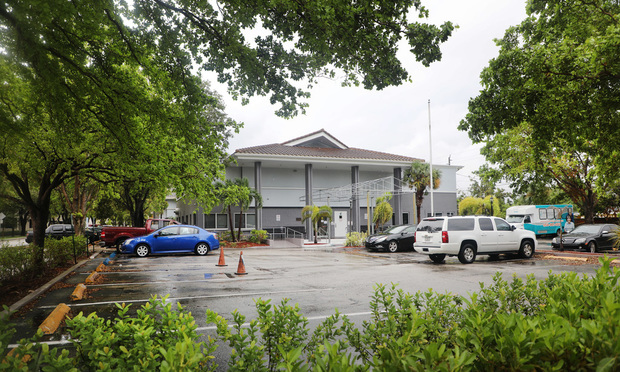Florida Gov. Scott Signs Bills Mandating Backup Power
Gov. Rick Scott signed legislation requiring backup power sources in Florida nursing homes and assisted living facilities, months after the deaths of several residents from a sweltering nursing home that lost power in a hurricane.
March 27, 2018 at 12:45 PM
3 minute read
 The Rehabilitation Center at Hollywood Hills/photo by J. Albert Diaz
The Rehabilitation Center at Hollywood Hills/photo by J. Albert Diaz
Gov. Rick Scott signed legislation requiring backup power sources in Florida nursing homes and assisted living facilities, months after the deaths of several residents from a sweltering nursing home that lost power in a hurricane.
The legislation requires the facilities to have a generator capable of keeping nursing homes and assisted living facilities at 81 degrees Fahrenheit or lower for at least four days. All of Florida's 685 nursing homes and 3,089 assisted living facilities must be in compliance by the June 1 start of hurricane season. State agencies can grant an extension until Jan. 1, 2019, for facilities that would face delays in installing equipment or need zoning or other regulatory approval.
“As we near hurricane season, families can now know the facilities responsible for caring for their loved ones will have the resources needed to be fully prepared ahead of any potential storms,” Scott said in a statement.
Officials from the state's Agency for Health Care Administration, which oversees nursing homes, and the Department of Elder Affairs, which regulates assisted living facilities, did not have updated numbers on how many facilities were already in compliance. As of January, 108 nursing homes and 138 assisted living facilities had installed the necessary equipment.
“Florida faces an annual risk from Mother Nature, and these rules will help keep seniors safe during a possible devastating weather event or … prolonged power outage,” said Justin Senior, secretary of the Agency for Health Care Administration.
The rule was originally issued by Scott, Florida's Agency for Health Care Administration and the Department of Elder Affairs following the deaths at the Hollywood Hills Rehabilitation Center after Hurricane Irma in September. The original rule stated that nursing homes and assisted living facilities had to be in compliance by Nov. 15 or face a fine of $1,000 per day. But a state administrative judge sided last October with nursing homes that had challenged the tight deadlines.
In January, state nursing homes agreed to the revised rules. The rules also now take into consideration that assisted living facilities are licensed differently based on number of beds.
The original rules mandated 50 square feet per resident needed to be kept cool but it has been lowered to 30 square feet for nursing homes and 20 square feet for assisted living facilities. While nursing homes need 96 hours of fuel on site during a weather emergency, the hours vary for assisted living facilities from 48 hours for facilities with 16 beds or less to 72 hours for those with 17 or more beds.
State officials estimate it will cost nearly $430 million for facilities to comply.
Legislators though during the recently concluded session agreed to waive sales taxes up to $15,000 for facilities that still haven't purchased generators or did so after July 1, 2017.
Joe Reedy reports for the Associated Press.
This content has been archived. It is available through our partners, LexisNexis® and Bloomberg Law.
To view this content, please continue to their sites.
Not a Lexis Subscriber?
Subscribe Now
Not a Bloomberg Law Subscriber?
Subscribe Now
NOT FOR REPRINT
© 2025 ALM Global, LLC, All Rights Reserved. Request academic re-use from www.copyright.com. All other uses, submit a request to [email protected]. For more information visit Asset & Logo Licensing.
You Might Like
View All
Automaker Pleads Guilty and Agrees to $1.6 Billion in Payouts

Read the Document: DOJ Releases Ex-Special Counsel's Report Explaining Trump Prosecutions
3 minute readTrending Stories
- 1South Florida Attorney Charged With Aggravated Battery After Incident in Prime Rib Line
- 2'A Death Sentence for TikTok'?: Litigators and Experts Weigh Impact of Potential Ban on Creators and Data Privacy
- 3Bribery Case Against Former Lt. Gov. Brian Benjamin Is Dropped
- 4‘Extremely Disturbing’: AI Firms Face Class Action by ‘Taskers’ Exposed to Traumatic Content
- 5State Appeals Court Revives BraunHagey Lawsuit Alleging $4.2M Unlawful Wire to China
Who Got The Work
J. Brugh Lower of Gibbons has entered an appearance for industrial equipment supplier Devco Corporation in a pending trademark infringement lawsuit. The suit, accusing the defendant of selling knock-off Graco products, was filed Dec. 18 in New Jersey District Court by Rivkin Radler on behalf of Graco Inc. and Graco Minnesota. The case, assigned to U.S. District Judge Zahid N. Quraishi, is 3:24-cv-11294, Graco Inc. et al v. Devco Corporation.
Who Got The Work
Rebecca Maller-Stein and Kent A. Yalowitz of Arnold & Porter Kaye Scholer have entered their appearances for Hanaco Venture Capital and its executives, Lior Prosor and David Frankel, in a pending securities lawsuit. The action, filed on Dec. 24 in New York Southern District Court by Zell, Aron & Co. on behalf of Goldeneye Advisors, accuses the defendants of negligently and fraudulently managing the plaintiff's $1 million investment. The case, assigned to U.S. District Judge Vernon S. Broderick, is 1:24-cv-09918, Goldeneye Advisors, LLC v. Hanaco Venture Capital, Ltd. et al.
Who Got The Work
Attorneys from A&O Shearman has stepped in as defense counsel for Toronto-Dominion Bank and other defendants in a pending securities class action. The suit, filed Dec. 11 in New York Southern District Court by Bleichmar Fonti & Auld, accuses the defendants of concealing the bank's 'pervasive' deficiencies in regards to its compliance with the Bank Secrecy Act and the quality of its anti-money laundering controls. The case, assigned to U.S. District Judge Arun Subramanian, is 1:24-cv-09445, Gonzalez v. The Toronto-Dominion Bank et al.
Who Got The Work
Crown Castle International, a Pennsylvania company providing shared communications infrastructure, has turned to Luke D. Wolf of Gordon Rees Scully Mansukhani to fend off a pending breach-of-contract lawsuit. The court action, filed Nov. 25 in Michigan Eastern District Court by Hooper Hathaway PC on behalf of The Town Residences LLC, accuses Crown Castle of failing to transfer approximately $30,000 in utility payments from T-Mobile in breach of a roof-top lease and assignment agreement. The case, assigned to U.S. District Judge Susan K. Declercq, is 2:24-cv-13131, The Town Residences LLC v. T-Mobile US, Inc. et al.
Who Got The Work
Wilfred P. Coronato and Daniel M. Schwartz of McCarter & English have stepped in as defense counsel to Electrolux Home Products Inc. in a pending product liability lawsuit. The court action, filed Nov. 26 in New York Eastern District Court by Poulos Lopiccolo PC and Nagel Rice LLP on behalf of David Stern, alleges that the defendant's refrigerators’ drawers and shelving repeatedly break and fall apart within months after purchase. The case, assigned to U.S. District Judge Joan M. Azrack, is 2:24-cv-08204, Stern v. Electrolux Home Products, Inc.
Featured Firms
Law Offices of Gary Martin Hays & Associates, P.C.
(470) 294-1674
Law Offices of Mark E. Salomone
(857) 444-6468
Smith & Hassler
(713) 739-1250








